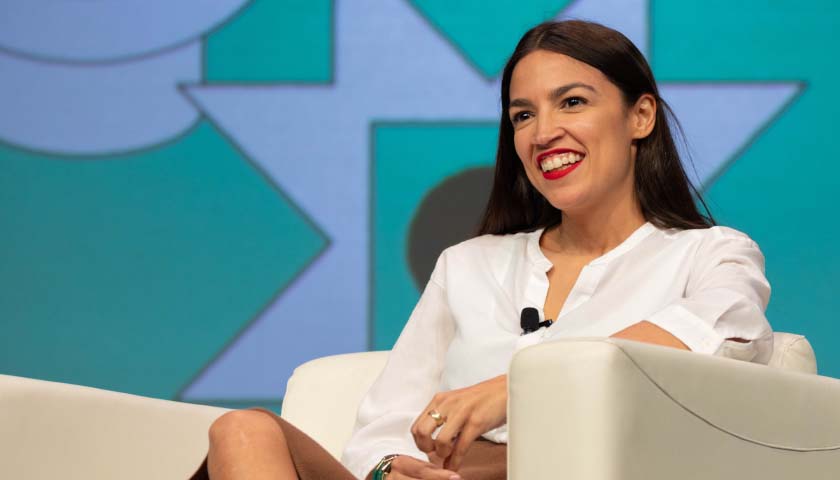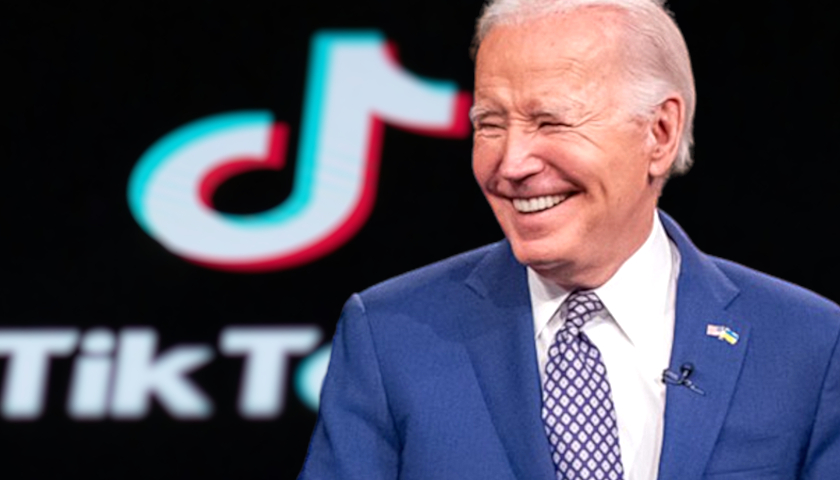by Zachary Marschall, PhD
Freedom in Australia is now at the mercy of a state and its police apparatus bent on controlling people’s every movement.
But despite the extensive footage of protests gone violent, neither American liberal media nor domestic social justice movements are raising alarms about police brutality in that country.
On Monday – 18 days after imposing a vaccine mandate on small businesses – President Biden said that 98 percent of Americans needed to be vaccinated in order for the country to have hope for normalcy. Biden is exempting illegal immigrants from the same requirement because those Haitian migrants in Del Rio are “not intending to stay here for a lengthy period of time,” as Press Secretary Jen Psaki explained one week prior.
Hot-take pundits harp on these double-standards, but claims of political bias and bureaucratic mismanagement only scratch the surface of the problem.
The problem is that those currently with the power to restrict lives and constrict behavior think themselves ordained to do so. By virtue of their woke enlightenment, they know better and do better. And that insufferable self-piety removes the progressive elites – in their eyes – from the experiences the rest must endure.
More specifically, the progressive elite has internalized a newly minted cultural caste system to create a set of acceptable norms and mores from which they exempt themselves at their convenience.
Think calling it a caste is exaggeration? Last month’s Met Gala in New York is photographic proof that such post-COVID social division in this country has congealed.
“In the back you see all the ‘help’ in masks while they strut around smiling with this on their butts. It’s quite the image,” Ricochet editor Bethany Mandel tweeted September 13 above a picture of a resplendently maskless Alexandria Ocasio-Cortez.
In the back you see all the “help” in masks while they strut around smiling with this on their butts. It’s quite the image. pic.twitter.com/0R3cOosntb
— Bethany S. Mandel (@bethanyshondark) September 14, 2021
This new caste system requires, perhaps ironically for this news outlet, an academic explanation that helps expose the progressive elite’s contemptible creation for the artifice that it is.
As Campus Reform reports daily, leftist values, ideologies, and terminology have trickled down from the ivory tower over the last 50 years and into our mainstream society to the detriment of this country’s social cohesion and sense of national pride.
Institutions of higher education lay at the root of this country’s cultural ills, and that is why academic arguments and terminology are occasionally required to comprehend those problems thoroughly.
Patrimony is one such concept that can help explain why America’s progressive elite selectively apply their censorship and restrictions.
Patrimony, as the Oxford English Dictionary (OED) explains, is the property or domain – historically an estate – of a certain class that is inherited by subsequent generations within that social group.
Consequently, this socio-economic group feels a sense of ownership over their dominion – an uncompromising outlook on stewardship that is reminiscent of the aristocratic confidence featured on British period dramas.
UCLA professor David D. Kim demonstrates in his 2021 book Reframing Postcolonial Studies: Concepts, Methodologies, Scholarly Activisms what the OED also states – that patrimony can be both abstract and tangible. It can describe a set of cultural practices and values in addition to land.
But whether abstract or tangible, the sense of perpetual ownership – of inheritance – is constant.
Accordingly, not every academic’s invocation of patrimony contains the term, but it almost certainly references the concept of inheritance directly.
For example, Campus Reform reported in 2017 on the “Multi-Cultural Leadership on Eco-Social Justice” program at the University of Colorado, Boulder. In touting the merits of the program, the university stated that it would “build a community of change agents, explore questions of identity and place, heritage and inheritance, root causes of the global unravelling, and create community solutions.”
Notice the word “inheritance” in that laundry list of activist goals? There’s a reason it is invoked with those calls to action. It represents a research agenda to reassert ownership as a means to realize leftists’ desired outcomes in the real world.
For example, in laying out his argument for reframing postcolonial studies – a fancy name for the decolonization movements that Campus Reform frequently covers – Kim calls for moving the concept of patrimony “to the center of postcolonial critique and activism.” That academic move, according to Kim, would create real world applications for undoing and dismantling the inequities he observes.
Though patrimony is a useful concept that scholars often invoke in a wide range of projects across the political spectrum, leftist academics have a penchant to pick up the term in order to push the “decolonization” narrative that erect barriers between groups based on identity.
In 2019, for example, George Washington University hosted “Transgiving,” a counter-cultural take on Thanksgiving that, not unlike the holiday’s staple side dish, stuffed discussions on the “impacts of colonialism” with compelled speech in the form of ““non-binary or genderqueer or agender or genderfluid or bigender or femme or masc or andro or… an ally!” pronouns into one neat package.
That event was part of a national trend among universities to “decolonize” the holiday through programming on campus. Also in 2019, Indiana University of Pennsylvania hosted a “Decolonize Thanksgiving” event in coordination with the school’s Native American Awareness Council and Social Equity and Title IX office.
IUP’s events page stated that “[s]tories told about the first Thanksgiving often perpetuate harmful stereotypes and racism,” Campus Reform reported that last pre-COVID autumn.
Events like “Decolonize Thanksgiving” and “Transgiving” represent a link between leftist academics’ theoretical research agendas and the practical systemic changes they want to realize.
Radical scholars need students to live out their preferred ideologies on campus so that those young adults can graduate and go out in the world to create change through daily progressive politics.
Over time, those students grow up, and many progressive ones acquire positions of leadership from which they can recreate the world in the image of their senior-year seminar.
As Campus Reform’s coverage demonstrates, ideas perpetuated in academia do not stay tucked away in higher education; these notions find their way down from and out of the ivory tower.
In practice, patrimony is a velvet glove cloaking the instruments of control in the emergent ‘New Woke Order,’ which Joel Kotkin, a fellow at Chapman University, characterizes as “neo-feudalism” in his 2020 book, The Coming of Neo-Feudalism: A Warning to the Global Middle Class.
Consider Annie Karni, The New York Times reporter who in August rationalized former President Obama’s over-the-top birthday party by stating the attendees were a “sophisticated” crowd, is part of Kotkin’s “clerisy.”
Karni is an example of how neo-feudalism is at work in 2021, formalizing the power of the progressive elite as America’s predominant cultural caste.
Kotkin distills in his book the new lord-vassal relationships at work in society, as well as how the woke oligarchy, the progressive political class, and “clerisy,” which he defines as the “class of thought leaders and opinion makers” operate in concert akin to pre-revolutionary France’s Estates-General.
Karni may not have Jeff Bezo’s wealth or Nancy Pelosi’s power, but she has the agency to perpetuate narratives of exemption and preference on to those removed from progressive power.
Recall Australia.
Now, consider the letter over 1,200 doctors and scientists signed June 2020 that argued anti-police protests should not be stopped due to COVID-19.
This cause negated the same concerns that instigated the lockdowns, according to the health experts, because the signatories saw the protests as “vital to the national public health and to the threatened health specifically of Black people in the United States.”
How does sophistication make one immune from COVID-19? How does the virus know to pass over protests chanting the right slogans?
Neither one of these entities has that capacity. And that is the point.
The Biden administration has contempt for the unvaccinated. The president mandates Americans to be vaccinated, but exempts illegal immigrants with those miraculously short itineraries.
Those migrants are the ward of the compassionate woke, and consequentially as the progressive elite’s dominion, do not receive the same blame unvaccinated Americans get from Biden for prolonging the pandemic.
Does the progressive elite know better than the rest of America? Of course not. But they have the tools at their disposal to gaslight those who question their judgment.
Don’t be fooled by their pretense to exemption or preferred treatment.
The progressive elite virtue signal mask-wearing to maintain social compliance, but their claims that some people don’t need their protocols, while others do, is pure deceit.
The virus doesn’t care about the political leanings of its host.
The progressive elite is enthralled by their sense of burden to regulate the speech, movement, and ideas of others. By virtue of their compassion and cultural disposition, they have inherited the responsibility to remake society.
And in that serene state of sophistication, they understand that uneasy is the head that wears the crown in their new woke feudal order.
It is ironic, then, that wearing a ‘crown’ allows one to be exempted from wearing a mask.
– – –
Zachary Marschall is the Managing Editor for Campus Reform. He received a PhD from George Mason University and is an Adjunct Assistant Professor at the University of Kentucky. “Academically Speaking,” his series for Campus Reform, reveals how radical ideas originating in academia impact Americans’ daily lives.
Zachary received his master’s degree from the Newhouse School at Syracuse University and helped launch the peer-reviewed journal Arts & International Affairs in 2015 as the publication’s inaugural Managing Editor. He is also a former student member of the National Association of Scholars and holds a BA from NYU’s Tisch School of the Arts.
Photo “Alexandria Ocasio-Cortez” by nrkbeta. CC BY-SA 2.0.
“Academically Speaking” is a series by Campus Reform Managing Editor Zachary Marschall that, drawing on his firsthand experience working with other scholars across the globe, to reveal how radical ideas originating in academia impact Americans’ daily lives. Marschall holds a PhD in Cultural Studies and is an adjunct professor at the University of Kentucky. His research investigates the intersections of democratic political systems, free market economies, and technological innovation in the production of national and cultural identities, as well as the exchange of cultural goods, services, and practices.








